|
Volume-based user fee for garbage:
Mechanism to check solid waste
By Ranil Wijayapala
Have you ever thought that the garbage pack collected on a daily
basis at your doorstep would be a burden to you? Yes, whether you agree
or not for many people living in highly urbanised areas, the huge
garbage pack and other form of waste generated are becoming a big
headache as the limited space available is not enough to manage the
garbage properly.
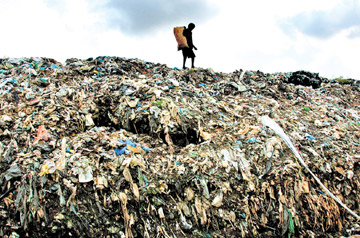 |
|
A masssive garbage dump
at Bloemendhal |
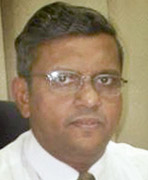 |
|
Priyantha Samarakkody |
However, people easily ignore the responsibility after leaving their
garbage pack outside their gates, shifting the responsibility to the
waste collectors of the local government body in the respective areas
whether Municipal Council, Urban Council or Pradeshiya Sabha.
The only justification they have is that the rate money they pay to
the local authorities annually binds the local authority to collect the
garbage at their residence. Based on that, they tend to ignore the
problem they transfer to the local authorities. But, it is not the end.
They protest when the local authorities dump garbage near their
residences complaining of health and environmental hazards and ignoring
the fact they are also responsible either directly or indirectly to
create the nuisance.
The time is now ripe for the local authorities and the people to
think more seriously and positively about the waste generated in their
homes as the estimates of local government bodies for their annual
budgets indicate that they spend more than 20 to 30 percent on solid
waste management, and it has become a costly exercise on human resource,
health and environmental aspects.
The Western Province, responsible for 60 percent of the garbage
generation in the country is rethinking of the situation to find
effective ways to handle the garbage in the limited space they have in
the province to manoeuvre the system. Director, Waste Management
Authority of the Western Provincial Council Priyantha Samarakkody, said
as a solution for the huge expenses the local authorities have to bear
in handling the Municipal solid waste, they propose to introduce a
volume based user fee from the people in the respective local authority.
The Waste Management Authority of the Western Provincial Council
established under Statute No. 9 of 1999 was amended to address the waste
management issues in the province. In 2009 it adopted seven waste
management steps and 70 waste management rules to provide a legal basis
for the waste management in the Western Provincial Council.
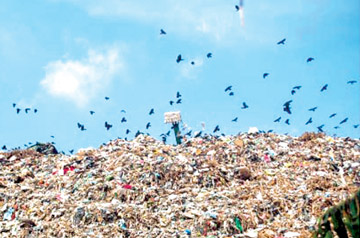 |
|
Garbage dumped in a
residential area in Kolonnawa |
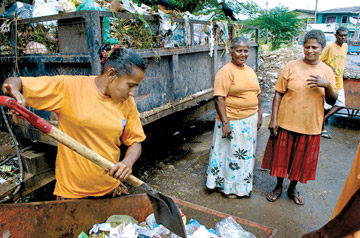 |
|
Municipal workers
collecting garbage |
"That has now become a Provincial law and the mixing of waste, open
burning and keeping municipal solid waste as a nuisance to the general
public has been identified as offences. Under this spot fines can be
imposed from Rs. 500 to Rs.5,000 for violating these rules. In addition
a court fine of Rs. 5,000 to 50,000 or an imprisonment from three months
to one year can be imposed by the Court", he said.
Since the WMA is implementing clean cities programmes in 48 villages
by introducing seven steps in waste management, composting programmes
and other waste management mechanisms it has selected 12 local
authorities to implement the volume based user fee for municipal solid
waste.
Accordingly Wattala Pradeshiya Saba, Wattala Urban Council, Horana
Uraban Council, Horana Pradehiya Saba, Kalutara Urban Council, Kalutara
Pradeshiya Saba, Negombo Municipal Council, Katana Pradehiya Saba,
Kaduwela Municipal Council, Attanagalla Pradeshiya Saba, Ja-Ela
Pradeshiya Saba and Seethawakapura Urabn Council have been selected for
the implementation of the volume based user fee for municipal solid
waste.
"To introduce this system in 2013, we are developing project
proposals and funding will be done by WMA. Of these 12 local
authorities, Wattala Urban Council, Wattala Pradeshiya Saba and Kelaniya
Pradeshiya Saba will be selected to implement it as a model project
under the Korea International Cooperation Agency assistance to prepare
guideline for volume based waste fee", Samarakkody said.
The Ministry of Defence and Urban Development, the Ministry of Local
Government and Provincial Councils and the Ministry of Environment are
extending their cooperation to the WMA to introduce this volume based
user fee system.
The WMA has taken lessons from Korea which has been successful in
implementing waste management systems over the past two decades through
the introduction of volume based user fee from the people to handle
municipal solid waste.
Like in Korea the WMA is also planning to charge this fee through the
garbage bags issued to the market through local authorities and the WMA.
The price of the bag will include the fee for the handling of the
municipal waste by the local authorities as they will collect the waste
contained only in the bags authorised by the WMA."But through the
introduction of this user fee we are not charging a fee from every type
of waste. Only the mixed waste has to be put in these bags for
collection by waste collectors", he said.
The food waste, recyclable waste like glass, metal paper,
construction and demolishing waste will not be charged under this system
once these wastes are segregated at the source and kept in different
bags for collection by the waste collectors.
"Only the mixed waste will be charged. That is about 18 percent of
the total waste generation. If people are not interested in segregating
their construction, demolishing and recyclable waste they may have to
pay more. They would be paying because of their ignorance and laziness.
The polluter is paying and it can be addressed", he said."By imposing a
municipal solid waste user fee we will be charging for managing solid
waste such as water electricity and other services provided by the
government.
I believe Sri Lanka is the only country attending to waste management
without a fee, for which the government is spending and the tax payers'
money is being used for this purpose. If the user does not pay the
government has to pay. If the government is not paying the environment
would pay for it", he said.
"This depicts why the volume based user fee is important and will
provide the much needed funds for the local government authorities. By
effecting this system through the bags it will be easy to implement
since it will have less public resistance", he said.
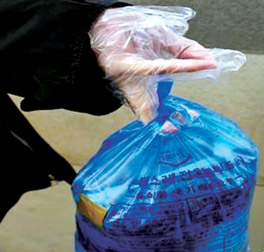 |
|
The special garbage bag |
The WMA will get assistance from KOICA to produce the bags as
manufacturing them locally could pave the way for inferior quality bags
to enter the market.
Explaining the system Samarakkody said if we take 20 litre bags it
could be sold at Rs. 50. According to Provincial regulations, 20 percent
of that should come to the WMA. Another Rs. 5 should be allocated for
the manufacture and marketing of the bag, and the balance Rs. 35 can be
allocated to the local authority for the collection, transportation and
disposal of the garbage.
If we assume that a 20 litre bag has the capacity for 7 Kg, it means
for one ton or a thousand Kgs of garbage, the local authority gets Rs.
5,000 for the collection, transportation and disposal.
"This, I believe is very much appropriate because actually with this
Rs. 5,000 they have to collect perishable and, recyclables waste free of
charge though they are charging only for the mixed waste. The local
authority can differ on whether to increase or decrease the price
depending on the facilities available to them to make use of garbage",
he said."If the local authority has a big compost facility and if they
have a big market for the compost they could earn money from
perishables. Supposing Kaduwela Municipal Council, segregate their waste
at the site they can reduce the Rs. 50 to Rs. 25. But for the final
disposal they have to pay for the transportation.
Therefore they can charge the same fee considering the expenses they
have to bear in handling the municipal solid waste. Once the waste to
energy project in Kaduwela is implemented in 2014 the Kaduwela Municipal
Council can decide how it can be reduced as they get a place to dispose
the garbage at a closer site", he said. "But when the local authorities
charge a user fee they have to send the vehicles not at the time they
wish but to satisfy the community. The day and time of collection,
should be informed to the community. It will be a great convenience to
the community", he said. "To implement this program we requested KOICA
to fund the bags.
All the other expenses will be borne by the WMA but bags we expect
from KOICA because if we manufacture these bags here, there is a
possibility of illegal bags coming to the market. To get rid of that
problem we requested initially about 10,000 US Dollars worth bags to be
produced in Korea," he said.
"Within a short period we will be able to start writing guidelines
for the three local authorities selected as model projects and these
guidelines can be used for the other nine local authorities also. Next
year it should be extended for the balance local authorities in the
Western Province", he said. Prior to the implementation of the project
the WMA has organised several discussions, meetings and workshops to
introduce the system to the 12 selected local authorities. "Funding from
Provincial Council has been secured for the year 2013 for the execution
of this program and the Korean Government jointly with the Environment
Ministry of Sri Lanka also organised workshops to educate the officials
regarding the implementation of the program", he said. "It is timely to
implement this mechanism. The Ministry of Local Government, Ministry of
Defence and Urban Development, Ministry of Environment through the
Central Environment Authority will assist waste management authority to
execute the volume based user fee at these 12 local authorities", he
said.
|



